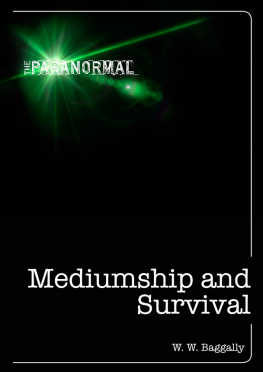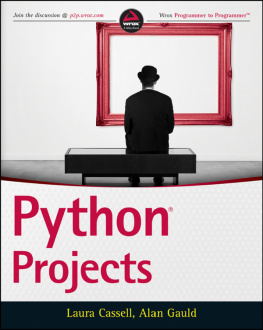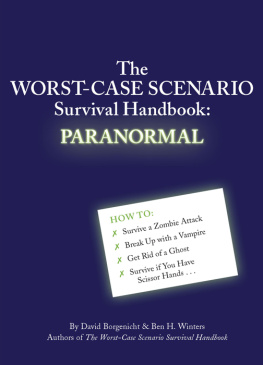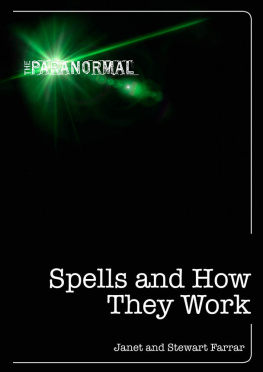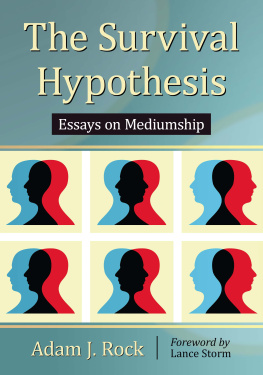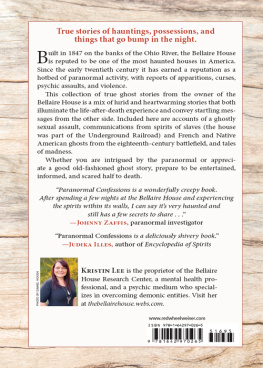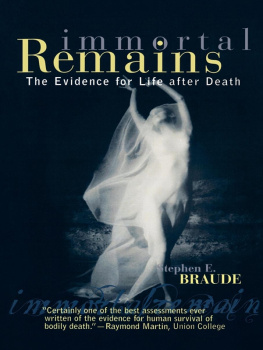For their kindness in reading a draft of this work, and for many helpful comments and suggestions, I am much indebted to Ian Stevenson, Brian Inglis, John St John, Louise Bloomfield and John Beloff. For valuable help in various related matters I have to thank Bernard Carr, Tony Cornell, Sam Grainger, Eleanor OKeeffe, D. N. Clarke-Lowes, Emily Williams Cook, and Bert Haylett.
Foreword
Around the year 1873, Frederic Myers was to recall in his Human Personality, a small group of Cambridge friends came to the conclusion that neither religion nor materialism had provided satisfactory answers to questions that were puzzling them:
Our attitudes of mind were in some ways different; but to myself, at least, it seemed that no adequate attempt had yet been made even to determine whether anything could be learnt as to the unseen world or no; for that if anything were knowable about such a world in such fashion that Science could adopt and maintain that knowledge, it must be discovered by no analysis of tradition, and by no manipulation of metaphysics, but simply by experiment and observation simply by the application to phenomena within us and around us of precisely the same methods of deliberate, dispassionate exact inquiry which have built up our actual knowledge of the world which we can touch and see.
Along with his friends chief among them Henry Sidgwick and Edmund Gurney Myers became one of the founder members of the Society for Psychical Research, when it was formed in 1882 to put these ideas into practice, and this series is being published to mark the Societys centenary.
The phenomena of the unseen world to which Myers referred were originally for convenience put into five categories, each of which a committee was set up to investigate: telepathy, hypnotism, sensitives, apparitions and the various physical phenomena commonly called Spiritualistic. Over the years the emphasis has to some extent shifted in particular hypnotism, which at that time was dismissed as an occult delusion, was just about to be accepted as a reality, so it ceased to be on the psychic side of the fence. But broadly speaking, the phenomena under investigation are the same, and the ways in which they have been investigated have remained as Myers planned.
The terminology, however, was changed and changed rather often, which made for some confusion. Myers himself introduced telepathy, as thought reading was ambiguous; it could refer to the way in which Sherlock Holmes picked up what was in Watsons mind by watching his expression. Supernormal, however, which Myers thought preferable to supernatural to describe the class of phenomena with which the Society would be dealing, has since itself been replaced by paranormal; and parapsychology has been easing out psychical research though some researchers prefer to restrict its use to laboratory-type work, leaving psychical for research into spontaneous phenomena. Psi has also come in as an all-purpose term to describe the forces involved, or to identify them for example, in distinguishing a normal from a paranormal event.
If evidence were lacking for parascience as it might now more embracingly be described, because the emphasis of research has been shifting recently away from psychology to physics it could be found in the composition of the Society, from its earliest beginnings. There can be few organizations which have attracted so distinguished a membership. Among physicists have been Sir William Crookes, Sir John Joseph Thomson, Sir Oliver Lodge, Sir William Barrett and two Lord Rayleighs the third and fourth barons. Among the philosophers: Sidgwick himself, Henri Bergson, Ferdinand Schiller, L. P. Jacks, Hans Driesch, and C. D. Broad; among the psychologists: William James, William McDougall, Sigmund Freud, Walter Franklin Prince, Carl Jung and Gardner Murphy. And along with these have been many eminent figures in various fields: Charles Richet, a Nobel prizewinner in physiology; the Earl of Balfour, Prime Minister from 19026, and his brother Gerald, Chief Secretary for Ireland in 18956; Andrew Lang, polymath; Gilbert Murray, Regius Professor of Greek at Oxford and drafter of the first Covenant of the League of Nations; his successor at Oxford, E. R. Dodds; Mrs Henry Sidgwick, Principal of Newnham College, Cambridge; Marie Curie; the Hon Mrs Alfred Lyttleton, Delegate to the League of Nations Assembly; Camille Flammarion, the astronomer, and F. J. M. Stratton, President of the Royal Astronomical Society; and Sir Alister Hardy, Professor of Zoology at Oxford.
Such a list, as Arthur Koestler pointed out in The Roots of Coincidence, ought to be sufficient to demonstrate that ESP research is not a playground for superstitious cranks. On the contrary, the standards of research have in general been rigorous far more rigorous, as psychologists have on occasion had to admit, than those of psychology. The reason that the results have not been accepted is basically that they have not been acceptable: extra-sensory perception and psychokinesis have remained outside sciences domain, in spite of the evidence. And although the prejudice against parapsychology has been breaking down, so that it is being admitted as an academic discipline in universities, it is still very far from securing a firm base in the academic world.
Sceptics have sedulously propagated the notion that psychical researchers believe in ESP, PK, apparitions, and so on because they long to believe, or need to believe. Anybody who has studied the Societys Journals and Proceedings, or attended its meetings, will testify that this is a ludicrous misconception. Many of the most assiduous and skilled researchers have originally been prompted by disbelief by a desire, say to expose a medium as a fraud. It has to be remembered, too, that many, probably the great majority, of the members have been and still are desirous of showing that paranormal manifestations are natural, and can be explained scientifically though admittedly not in the narrow terms of materialist science, which in any case the nuclear physicists have shown to be fallacious.
No: insofar as a Society containing such a diverse collection of individuals can be said to have a corporate identity, it could almost be described as sceptical; certainly as rational, as this series will show. Not, though, rationalist. Unluckily rationalists, in their determination to purge society of its religious and occultist accretions, often failed to draw a distinction between superstitions and the observed phenomena which gave rise to them which led them into such traps as refusing to accept the existence of meteorites, because of the association with Joves thunderbolts; and to this day, they are prone to lapse into support for dogmas as rigid, and as ill-founded, as any of those of the Churches. If the series does nothing else, it will show how rationally using that term in its proper sense the writers have examined and presented the evidence.

